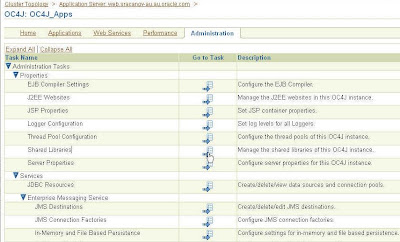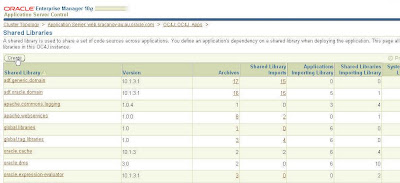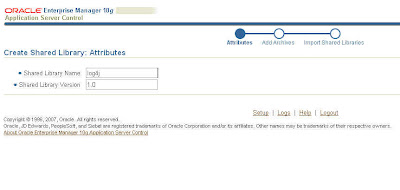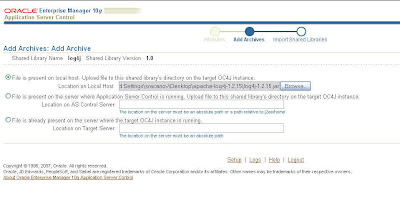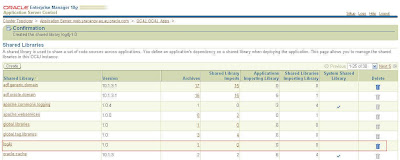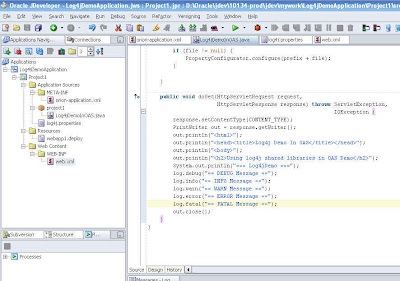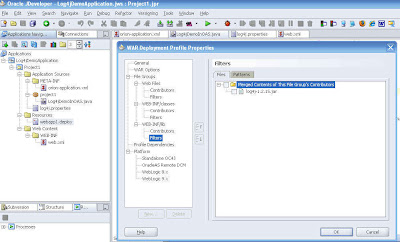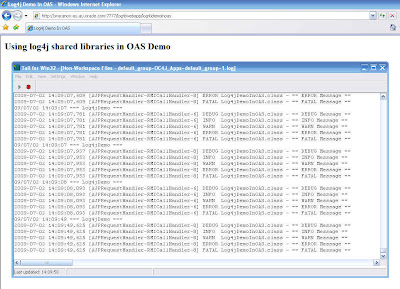11g Database Webservice Callout Steps
Posted by Steve Racanovic | Posted in DBMS Callout , Web Services | Posted on 10:02 AM
0
11g Database Webservice Callout Steps
I installed the 11g R2 database last week and though I'd go through notes 469588.1, 428775.1 and 841183.1 on My Oracle Support and jot down my steps for configuring UTL_DBWS and JPublisher to use a java webservice proxy from the database to call external webservices.
This is what I done:
1. Check to see if the database webservice utilities are installed in sys schema, check the status of the java classes and set the OJVM pool size.
a. Check and see if callout utilities are installed:
[oracle@sracanov-au2 dbhome_1]$ sqlplus /nolog SQL*Plus: Release 11.2.0.1.0 Production on Mon Dec 14 08:04:09 2009 Copyright (c) 1982, 2009, Oracle. All rights reserved. SQL> conn sys/ as sysdba Enter password: Connected. SQL> desc sys.utl_dbws ERROR: ORA-04043: object sys.utl_dbws does not existb. Check the status of the java classes:
SQL> SELECT owner, status, count(*) FROM DBA_OBJECTS WHERE OBJECT_TYPE='JAVA CLASS' GROUP BY owner, status; OWNER STATUS COUNT(*) ------------------------------ ------- ---------- MDSYS VALID 531 SYS VALID 20444 EXFSYS VALID 47 ORDSYS VALID 1898c. Set the OJVM pool size. I'm setting the size as per note 469588.1. Although the online documentation suggest java_pool_size is set to at least 96 MB and shared_pool_size is set to at least 80 MB. http://download.oracle.com/docs/cd/E11882_01/java.112/e10587/intro.htm#BHCBACII. If this is not set, then loading and resolving java classes (jars) will occur errors:
SQL> show parameter SHARED_POOL_SIZE NAME TYPE VALUE ------------------------------------ ----------- ------------------------------ shared_pool_size big integer 0 SQL> show parameter JAVA_POOL_SIZE NAME TYPE VALUE ------------------------------------ ----------- ------------------------------ java_pool_size big integer 0 SQL> alter system set SHARED_POOL_SIZE=132M scope=both; System altered. SQL> alter system set JAVA_POOL_SIZE=80M scope=both; System altered. SQL> show parameter SHARED_POOL_SIZE NAME TYPE VALUE ------------------------------------ ----------- ------------------------------ shared_pool_size big integer 132M SQL> show parameter JAVA_POOL_SIZE NAME TYPE VALUE ------------------------------------ ----------- ------------------------------ java_pool_size big integer 80M SQL>2. Download JPublisher & Database Web Services Callout Utilities
Webpage:
http://www.oracle.com/technetwork/database/features/jdbc/index-091264.html
Download - JPublisher 10g Release 10.2:
http://download.oracle.com/otn/utilities_drivers/jdbc/10201/jpub_102.zip
Webpage:
http://www.oracle.com/technetwork/database/enterprise-edition/index-097123.html
Download - 10.1.3.1 Callout Utility for 10g and 11g RDBMS (ZIP, ~13MB):
http://download.oracle.com/technology/sample_code/tech/java/jsp/dbws-callout-utility-10131.zip
3. Setup the OS environment:
[oracle@sracanov-au2 ~]$ export ORACLE_HOME=/u01/programs/oracle/product/11.2.0/dbhome_1 [oracle@sracanov-au2 ~]$ export JAVA_HOME=$ORACLE_HOME/jdk [oracle@sracanov-au2 ~]$ export PATH=$ORACLE_HOME/bin:$ORACLE_HOME/OPatch:$ORACLE_HOME/sqlj/bin:$JAVA_HOME/bin:$PATH [oracle@sracanov-au2 ~]$ export CLASSPATH=$ORACLE_HOME/sqlj/lib/translator.jar:$ORACLE_HOME/sqlj/lib/runtime12.jar:$ORACLE_HOME/sqlj/lib/dbwsa.jar:$ORACLE_HOME/javavm/lib/aurora.zip:$ORACLE_HOME/jdbc/lib/ojdbc5.jar:$ORACLE_HOME/jdk/lib/dt.jar:$ORACLE_HOME/jdk/lib/tools.jar:$ORACLE_HOME/jlib/jssl-1_1.jar:$ORACLE_HOME/jlib/orai18n.jar:$ORACLE_HOME/rdbms/jlib/xdb.jar:$ORACLE_HOME/lib/xsu12.jar:$ORACLE_HOME/jlib/jndi.jar:$ORACLE_HOME/rdbms/jlib/aqapi.jar:$ORACLE_HOME/rdbms/jlib/jmscommon.jar:$ORACLE_HOME/lib/xmlparserv2.jarI extract the downloaded files in the next setup. You can set the classpath now or later. Doing it now for simplicity.
4. Extract the downloaded files:
a. Take a backup of sqlj folder first:
[oracle@sracanov-au2 ~]$ mv $ORACLE_HOME/sqlj $ORACLE_HOME/sqlj.orgb. Extract Jpub:
[oracle@sracanov-au2 ~]$ unzip jpub_102.zip -d $ORACLE_HOME Archive: jpub_102.zip creating: /u01/programs/oracle/product/11.2.0/dbhome_1/sqlj/ creating: /u01/programs/oracle/product/11.2.0/dbhome_1/sqlj/lib/ inflating: /u01/programs/oracle/product/11.2.0/dbhome_1/sqlj/lib/sqljutl.sql inflating: /u01/programs/oracle/product/11.2.0/dbhome_1/sqlj/lib/translator.jar inflating: /u01/programs/oracle/product/11.2.0/dbhome_1/sqlj/lib/runtime12.jar creating: /u01/programs/oracle/product/11.2.0/dbhome_1/sqlj/bin/ inflating: /u01/programs/oracle/product/11.2.0/dbhome_1/sqlj/bin/README.txt inflating: /u01/programs/oracle/product/11.2.0/dbhome_1/sqlj/bin/jpub.c inflating: /u01/programs/oracle/product/11.2.0/dbhome_1/sqlj/bin/jpub inflating: /u01/programs/oracle/product/11.2.0/dbhome_1/sqlj/bin/jpub.exe inflating: /u01/programs/oracle/product/11.2.0/dbhome_1/sqlj/README.txt creating: /u01/programs/oracle/product/11.2.0/dbhome_1/sqlj/demo/ creating: /u01/programs/oracle/product/11.2.0/dbhome_1/sqlj/demo/jpub/ inflating: /u01/programs/oracle/product/11.2.0/dbhome_1/sqlj/demo/jpub/Booleans.sql inflating: /u01/programs/oracle/product/11.2.0/dbhome_1/sqlj/demo/jpub/Indexby.sql inflating: /u01/programs/oracle/product/11.2.0/dbhome_1/sqlj/demo/jpub/Inherit.sql inflating: /u01/programs/oracle/product/11.2.0/dbhome_1/sqlj/demo/jpub/MyRationalC.java inflating: /u01/programs/oracle/product/11.2.0/dbhome_1/sqlj/demo/jpub/MyRationalO.java inflating: /u01/programs/oracle/product/11.2.0/dbhome_1/sqlj/demo/jpub/MyRationalO8i.java inflating: /u01/programs/oracle/product/11.2.0/dbhome_1/sqlj/demo/jpub/PlsqlType.sql inflating: /u01/programs/oracle/product/11.2.0/dbhome_1/sqlj/demo/jpub/README.txt inflating: /u01/programs/oracle/product/11.2.0/dbhome_1/sqlj/demo/jpub/Rational.sql inflating: /u01/programs/oracle/product/11.2.0/dbhome_1/sqlj/demo/jpub/TestBooleans.java inflating: /u01/programs/oracle/product/11.2.0/dbhome_1/sqlj/demo/jpub/TestCallin.java inflating: /u01/programs/oracle/product/11.2.0/dbhome_1/sqlj/demo/jpub/TestIndexby.java inflating: /u01/programs/oracle/product/11.2.0/dbhome_1/sqlj/demo/jpub/TestInh.java inflating: /u01/programs/oracle/product/11.2.0/dbhome_1/sqlj/demo/jpub/TestInstall.sql inflating: /u01/programs/oracle/product/11.2.0/dbhome_1/sqlj/demo/jpub/TestInstallCreateTable.java inflating: /u01/programs/oracle/product/11.2.0/dbhome_1/sqlj/demo/jpub/TestInstallJDBC.java inflating: /u01/programs/oracle/product/11.2.0/dbhome_1/sqlj/demo/jpub/TestQuery.java inflating: /u01/programs/oracle/product/11.2.0/dbhome_1/sqlj/demo/jpub/TestMyRationalC.java inflating: /u01/programs/oracle/product/11.2.0/dbhome_1/sqlj/demo/jpub/TestMyRationalO.java inflating: /u01/programs/oracle/product/11.2.0/dbhome_1/sqlj/demo/jpub/TestMyRationalO8i.java inflating: /u01/programs/oracle/product/11.2.0/dbhome_1/sqlj/demo/jpub/TestPlsqlType.java inflating: /u01/programs/oracle/product/11.2.0/dbhome_1/sqlj/demo/jpub/TestRationalO.java inflating: /u01/programs/oracle/product/11.2.0/dbhome_1/sqlj/demo/jpub/TestRationalP.java inflating: /u01/programs/oracle/product/11.2.0/dbhome_1/sqlj/demo/jpub/WrDbmsUtil.sql inflating: /u01/programs/oracle/product/11.2.0/dbhome_1/sqlj/demo/jpub/connect.properties inflating: /u01/programs/oracle/product/11.2.0/dbhome_1/sqlj/demo/jpub/jpub.properties inflating: /u01/programs/oracle/product/11.2.0/dbhome_1/sqlj/demo/jpub/TemperatureService.wsdl creating: /u01/programs/oracle/product/11.2.0/dbhome_1/sqlj/doc/ inflating: /u01/programs/oracle/product/11.2.0/dbhome_1/sqlj/doc/faq.html [oracle@sracanov-au2 ~]$c. Extract Callout Utilities:
[oracle@sracanov-au2 ~]$ unzip dbws-callout-utility-10131.zip sqlj\* -d $ORACLE_HOME Archive: dbws-callout-utility-10131.zip inflating: /u01/programs/oracle/product/11.2.0/dbhome_1/sqlj/lib/utl_dbws_decl.sql inflating: /u01/programs/oracle/product/11.2.0/dbhome_1/sqlj/lib/utl_dbws_body.sql inflating: /u01/programs/oracle/product/11.2.0/dbhome_1/sqlj/lib/dbwsclientws.jar inflating: /u01/programs/oracle/product/11.2.0/dbhome_1/sqlj/lib/dbwsclientdb102.jar inflating: /u01/programs/oracle/product/11.2.0/dbhome_1/sqlj/lib/dbwsclientdb11.jar inflating: /u01/programs/oracle/product/11.2.0/dbhome_1/sqlj/lib/dbwsa.jar inflating: /u01/programs/oracle/product/11.2.0/dbhome_1/sqlj/lib/dbwsclientdb101.jar [oracle@sracanov-au2 ~]$ unzip dbws-callout-utility-10131.zip samples\* -d $ORACLE_HOME/sqlj Archive: dbws-callout-utility-10131.zip creating: /u01/programs/oracle/product/11.2.0/dbhome_1/sqlj/samples/ inflating: /u01/programs/oracle/product/11.2.0/dbhome_1/sqlj/samples/javacallout.wsdl inflating: /u01/programs/oracle/product/11.2.0/dbhome_1/sqlj/samples/test-plsql-dii.sql inflating: /u01/programs/oracle/product/11.2.0/dbhome_1/sqlj/samples/javacallout.ear [oracle@sracanov-au2 ~]$ unzip dbws-callout-utility-10131.zip *.htm -d sqlj/ Archive: dbws-callout-utility-10131.zip inflating: sqlj/10.htm inflating: sqlj/11.htm inflating: sqlj/README.htmd. Looking at the extracted files, there is no dbwsclient.jar.
http://download.oracle.com/docs/cd/E11882_01/java.112/e10587/intro.htm#BHCBACII
There is however dbwsclientws.jar. dbwsclientws.jar is the same as dbwsclient.jar. Jpub looks for this file when you run the jpub command. To avoid the error: 'Error loading dbwsclient.jar, please check the database trace file and make sure dbwsclient.jar exists in ORACLE_HOME/sqlj/lib.' when running the jpub command, I'll just make a copy of this file:
[oracle@sracanov-au2 lib]$ ls -al | grep dbwsc -rw-r--r-- 1 oracle oinstall 737386 Jun 18 2008 dbwsclientdb101.jar -rw-r--r-- 1 oracle oinstall 208486 Jun 18 2008 dbwsclientdb102.jar -rw-r--r-- 1 oracle oinstall 214156 Jun 18 2008 dbwsclientdb11.jar -rw-r--r-- 1 oracle oinstall 6716174 Aug 1 2008 dbwsclientws.jar [oracle@sracanov-au2 lib]$ cp dbwsclientws.jar dbwsclient.jar [oracle@sracanov-au2 lib]$ ls -al | grep dbwsc -rw-r--r-- 1 oracle oinstall 737386 Jun 18 2008 dbwsclientdb101.jar -rw-r--r-- 1 oracle oinstall 208486 Jun 18 2008 dbwsclientdb102.jar -rw-r--r-- 1 oracle oinstall 214156 Jun 18 2008 dbwsclientdb11.jar -rw-r--r-- 1 oracle oinstall 6716174 Dec 16 06:42 dbwsclient.jar -rw-r--r-- 1 oracle oinstall 6716174 Aug 1 2008 dbwsclientws.jar [oracle@sracanov-au2 lib]$I am not sure why they packaged it like this. It seems it was packaged dbwsclient.jar in the previous download version i.e. 10.1.3.0 Callout Utility for 10g RDBMS (ZIP, 6.89MB).
Note that I did not find this step crucial. I could still run jpub and each time I will get that error above 'Error loading dbwsclient.jar,..... It could still proceed without it and it worked fine in my example. However doing this I avoid seeing that error all the time when I run Jpub.
5. Set the execute permission on jpub:
[oracle@sracanov-au2 ~]$ cd $ORACLE_HOME/sqlj/bin [oracle@sracanov-au2 bin]$ chmod +x jpub6. I'm using the scott schema in this example. Check the schema has CONNECT, RESOURCE and CREATE PUBLIC SYNONYM grants. This is the minimum permission required. If not, allow for it.
SQL> SELECT grantee, granted_role FROM dba_role_privs where GRANTEE = 'SCOTT'; GRANTEE GRANTED_ROLE ------------------------------ ------------------------------ SCOTT RESOURCE SCOTT CONNECT SQL> select * from dba_sys_privs where GRANTEE='SCOTT'; GRANTEE PRIVILEGE ADM ------------------------------ ---------------------------------------- --- SCOTT UNLIMITED TABLESPACE NO SQL> grant CREATE PUBLIC SYNONYM to scott; SQL> select * from dba_sys_privs where GRANTEE='SCOTT'; GRANTEE PRIVILEGE ADM ------------------------------ ---------------------------------------- --- SCOTT UNLIMITED TABLESPACE NO SCOTT CREATE PUBLIC SYNONYM NO7. Load the database webservice callout utilities into the scott schema. The jar's are found in $ORACLE_HOME/sqlj/lib folder.
[oracle@sracanov-au2 bin]$ cd $ORACLE_HOME/sqlj/lib [oracle@sracanov-au2 lib]$ loadjava -u scott/tiger -r -v -f -s -grant public -genmissing dbwsclientws.jar dbwsclientdb11.jar >& loadjava.txtCheck the log and see if it completed successfully. It should look something like:
[oracle@sracanov-au2 lib]$ tail -8 loadjava.txt Classes Loaded: 4061 Resources Loaded: 81 Sources Loaded: 0 Published Interfaces: 0 Classes generated: 63 Classes skipped: 0 Synonyms Created: 0 Errors: 0 [oracle@sracanov-au2 lib]$(The values are likely to be different. This depends the on system environment and what already installed).
8. Once the database webservice call out classes have been loaded, I need to run the PL/SQL wrappers that will call theses classes. The scripts are found in $ORACLE_HOME/sqlj/lib folder. Since I installed the jar in scott, scott needs to run these scripts:
[oracle@sracanov-au2 lib]$ sqlplus scott/tiger SQL*Plus: Release 11.2.0.1.0 Production on Tue Dec 15 11:08:50 2009 Copyright (c) 1982, 2009, Oracle. All rights reserved. Connected to: Oracle Database 11g Enterprise Edition Release 11.2.0.1.0 - Production With the Partitioning, OLAP, Data Mining and Real Application Testing options SQL> @utl_dbws_decl.sql Package created. SQL> @utl_dbws_body.sql Package body created. Grant succeeded. SQL> desc utl_dbws PROCEDURE ADD_PARAMETER Argument Name Type In/Out Default? ------------------------------ ----------------------- ------ -------- CALL_HANDLE NUMBER IN XML_NAME VARCHAR2 IN Q_NAME VARCHAR2(4096) IN ... ...9. Grant the following classes from the SYS schema to scott. (or whichever schema your using. Ensure the schema name is in capital letters. i.e. 'SCOTT'):
SQL> conn /as sysdba
Connected.
SQL> call dbms_java.grant_permission('SCOTT','SYS:java.lang.RuntimePermission', 'shutdownHooks', '' );
SQL> call dbms_java.grant_permission('SCOTT','SYS:java.util.logging.LoggingPermission', 'control', '' );
SQL> call dbms_java.grant_permission('SCOTT','SYS:java.util.PropertyPermission','http.proxySet','write');
SQL> call dbms_java.grant_permission('SCOTT','SYS:java.util.PropertyPermission','http.proxyHost', 'write');
SQL> call dbms_java.grant_permission('SCOTT','SYS:java.util.PropertyPermission','http.proxyPort', 'write');
SQL> call dbms_java.grant_permission('SCOTT','SYS:java.lang.RuntimePermission','getClassLoader','');
SQL> call dbms_java.grant_permission('SCOTT','SYS:java.net.SocketPermission','*','connect,resolve');
SQL> call dbms_java.grant_permission('SCOTT','SYS:java.util.PropertyPermission','*','read,write');
SQL> call dbms_java.grant_permission('SCOTT','SYS:java.lang.RuntimePermission','setFactory','');
SQL> call dbms_java.grant_permission('SCOTT','SYS:java.lang.RuntimePermission', 'accessClassInPackage.sun.util.calendar','');
EXAMPLE 1:==========
10. Using the example code from note 841183.1, I will now use the UTL_DBWS package loaded in scott to call the webservice. The PL/SQL is created as follows:
a. Here is the PL/SQL code using UTL_DBWS to call an external webservice:
CREATE OR REPLACE FUNCTION celciusToFahrenheit(temperature NUMBER) RETURN VARCHAR2 AS
service_ scott.utl_dbws.SERVICE;
call_ scott.utl_dbws.CALL;
service_qname scott.utl_dbws.QNAME;
port_qname scott.utl_dbws.QNAME;
response sys.XMLTYPE;
request sys.XMLTYPE;
BEGIN
scott.utl_dbws.set_http_proxy('myproxy.com:80');
service_qname := scott.utl_dbws.to_qname(null, 'CelciusToFahrenheit');
service_ := scott.utl_dbws.create_service(service_qname);
call_ := scott.utl_dbws.create_call(service_);
scott.utl_dbws.set_target_endpoint_address(call_, 'http://webservices.daehosting.com/services/TemperatureConversions.wso');
scott.utl_dbws.set_property( call_, 'OPERATION_STYLE', 'document');
request := sys.XMLTYPE(''||temperature||'
b. I have changed line 11 with my proxy server details. If your environment does not use a proxy server leave this line out.c. Since the database webservice utilities have been installed in 'scott', I have changed all the 'sys' references to webservice utilities to 'scott'
d. Ensure you can access the webservice used in this example: http://webservices.daehosting.com/services/TemperatureConversions.wso
e: Now run the example:
SQL> @celciusToFahrenheit.sql Function created. No errors. SQL> SELECT celciusToFahrenheit(30) from dual; CELCIUSTOFAHRENHEIT(30) -------------------------------------------------------------------------------- 86 SQL>EXAMPLE 2:
==========
11. Now using the same webservice, I will use jpub to create and load the java webservice proxy classes to the database.
a. Run the jpub to create and load your java webservice client proxy. Here is the command used:
jpub -u scott/tiger -sysuser sys/welcome1 -proxywsdl=http://webservices.daehosting.com/services/TemperatureConversions.wso?WSDL -endpoint=http://webservices.daehosting.com/services/TemperatureConversions.wso -httpproxy=myproxy.com:80
Note I have specified my proxy again as the last parameter. If your environment does not use a proxy server leave this out.
[oracle@sracanov-au2 dbhome_1]$ cd sqlj [oracle@sracanov-au2 sqlj]$ mkdir example2 [oracle@sracanov-au2 sqlj]$ cd example2/ [oracle@sracanov-au2 example2]$ jpub -u scott/tiger -sysuser sys/welcome1 -proxywsdl=http://webservices.daehosting.com/services/TemperatureConversions.wso?WSDL -endpoint=http://webservices.daehosting.com/services/TemperatureConversions.wso -httpproxy=myproxy.com:80 tmp/src/genproxy/TemperatureConversionsSoapClientJPub.java plsql_wrapper.sql plsql_dropper.sql plsql_grant.sql plsql_revoke.sql Executing plsql_dropper.sql Executing plsql_wrapper.sql Executing plsql_grant.sql Loading plsql_proxy.jar [oracle@sracanov-au2 example2]$Note that when using jpub I can avoid coding PL/SQL code. The PL/SQL files can be found in the current local directory where jpub is run from. They have been executed while running the jpub command.
[oracle@sracanov-au2 example2]$ ls -al total 88 drwxr-xr-x 3 oracle oinstall 4096 Dec 16 07:27 . drwxr-xr-x 8 oracle oinstall 4096 Dec 15 10:43 .. -rw-r--r-- 1 oracle oinstall 95 Dec 16 07:27 plsql_dropper.sql -rw-r--r-- 1 oracle oinstall 548 Dec 16 07:27 plsql_grant.sql -rw-r--r-- 1 oracle oinstall 26546 Dec 16 07:27 plsql_proxy.jar -rw-r--r-- 1 oracle oinstall 404 Dec 16 07:27 plsql_revoke.sql -rw-r--r-- 1 oracle oinstall 3261 Dec 16 07:27 plsql_wrapper.sql drwxr-xr-x 4 oracle oinstall 4096 Dec 16 06:43 tmpb. Now call the web Service as in sqlplus.
SQL> conn scott/tiger
Connected.
SQL> select jpub_plsql_wrapper.celciusToFahrenheit(30) as "Celcius To Fahrenheit(30)" from dual;
Celcius To Fahrenheit(30)
-------------------------
86
SQL>
Running jpub has created the java webservice proxy for all the methods available from the webservice:SQL> select jpub_plsql_wrapper.fahrenheitToCelcius(86) as "Fahrenheit To Celcius(86)" from dual;
Fahrenheit To Celcius(86)
-------------------------
30
SQL>
For any further or clarification, see the following documentation:Oracle® Database JPublisher User's Guide
http://download.oracle.com/docs/cd/B28359_01/java.111/b31226/toc.htm
Database Web Service Callout Utility 10.1.3.1
http://www.oracle.com/technology/sample_code/tech/java/jsp/callout_users_guide.htm

